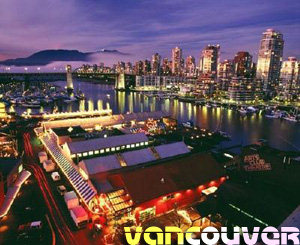A dream city with no problems? - Vancouver on eve of Winter Olympics
 Vancouver, Canada - Vancouver has the best quality of life of any big city in the world, according to the British international affairs magazine The Economist. The magazine grades cities around the globe according to criteria such as security, leisure, culture activities and transport.
Vancouver, Canada - Vancouver has the best quality of life of any big city in the world, according to the British international affairs magazine The Economist. The magazine grades cities around the globe according to criteria such as security, leisure, culture activities and transport.
The Canadian port city of Vancouver received 98 of the possible 100 points on offer in the study. But apart from the high score what makes Vancouver? What do locals think about their city which hosts the Winter Olympics in February?
"In the greater Vancouver area you can go skiing in the morning, sailing in the afternoon and still be back in time to enjoy the nightlife," says Manfred Scholermann, a German expatriate, quoting a commonly heard phrase.
Aside from skiing and sailing other popular activities include golf, mountain biking, paragliding, mountaineering, rowing, kayaking, angling and scuba diving. Thanks to its location between the Frazer River and the Strait of Georgia, which connects Vancouver to the Pacific, the city is hard to beat when it comes to outdoor pasttimes.
Scholermann came to Canada in the 1960s and today is boss of a company that organises day trips. Among the activities his company offers are whale watching, trekking in the protected coastal forest and tours around Chinatown.
Today, Scholermann is going to Stanley Park, located on a peninsula between English Bay and Burrard Inlet. The park consists of 400 hectares of land and is one of the biggest in North America.
A nine kilometre circular path takes cyclists, skaters and walkers along the water, passing boulders and beaches along the way. The warm weather has brought out a few people looking to get some sun. They lie in the grey sand, gaze out to sea through dark designer sunglasses and lean against washed up tree trunks. However, no-one is tempted to go swimming as it is almost always too cold.
The park's woodland provides an impression of what attracted settlers to this area 150 years ago besides gold and animal pelts. Enormous trees reach to the sky like wooden rockets. They include spruce trees that can grow between 50 and 60 metres high and whose trunks can be up to five metres in diameter, the hemlock tree that also reaches 70 metres and the Douglas fir -- the biggest in the world once measured 133 metres.
They are all as impressive as the glass and steel facades of the skyscrapers on the banks of the Coal Harbour and False Creek neighbourhoods.
Thomas Haas is another outdoor enthusiast and German expatriate. The 41-year-old was born in the Black Forest and has been living in Vancouver since 1995 where he runs a patisserie.
He keeps himself fit by jogging in the mountains and produces a certificate that shows he was part of the winning team that came first in the annual race of the 1,221-metre-high Grouse Mountain.
The Grouse Grind Trail rises 853 metres over 2.9 kilometres. Haas and his teammates completed the course in 35 minutes. Less fit competitors can expect to take up to two hours to cross the finishing line. On the way up, the terrace of the cable car station provides a small reward for the hard climb in the form of the best view of the city.
Down below and behind the high-rise buildings are Vancouver's sport arenas: the BC Place Stadium with seating for 60,000 as well as the ice hockey stadium. Daniel is on his way there. He's wearing a jersey from the Calgary Flames who are playing against the Vancouver Canucks on this day.
It's a west coast derby "that no one wants to miss," he says. Although the game is just a warm-up match the 18,000 seat stadium is almost sold out. After the game some of the fans head to the restaurants, bars and nightclubs in Yaletown.
Vancouver is not entirely a paradise for sports fans and many of the locals are lukewarm when it comes to the Winter Olympic Games. "I think the games are totally overblown," says Daryl Zimmermann, a saxophone busker, playing to fans leaving the game. But he is also sure the "majority think the games are a good thing simply because they love sport and believe it's a good opportunity to present Vancouver to the world."
Vancouver also has its social problems. Among them are homelessness and the city is also regarded as a centre of the illegal drug trade. Gangs regularly resort to using guns to stake their claims.
Another source of discussion has been the Olympic village because the cost of the designer residences has exploded. Locals think the success of the winter games will depend less on those issues than on one major concern: "The most important thing is that we win the ice hockey final against the US," says Daniel. (dpa)